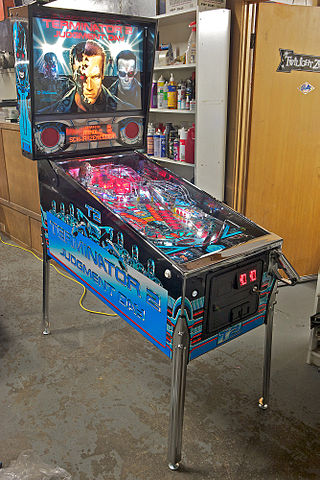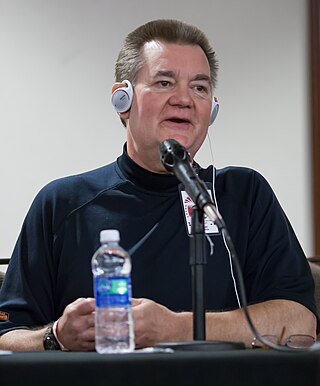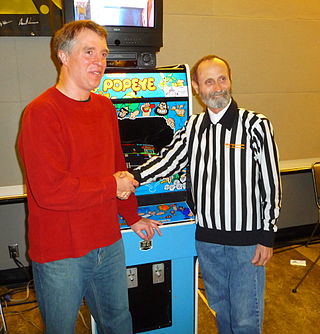Related Research Articles

Pinball games are a family of games in which a ball is propelled into a specially designed table where it bounces off various obstacles, scoring points either en route or when it comes to rest. Historically the board was studded with nails called 'pins' and had hollows or pockets which scored points if the ball came to rest in them. Today, pinball is most commonly an arcade game in which the ball is fired into a specially designed cabinet known as a pinball machine, hitting various lights, bumpers, ramps, and other targets depending on its design.

Psi-Ops: The Mindgate Conspiracy is an action adventure video game developed by Midway Games for Xbox, PlayStation 2 and Microsoft Windows and released on June 14, 2004. The game was developed as a means for Midway to develop new game physics capabilities. The primary game mechanic in Psi-Ops is the use of six different psychic abilities: telekinesis, remote viewing, mind drain, mind control, pyrokinesis, and aura view. These abilities are unlocked throughout the game and used in conjunction with stealth and third-person shooter gameplay to combat enemies and solve puzzles.

WMS Industries, Inc. was an American electronic gaming and amusement manufacturer in Enterprise, Nevada. It was merged into Scientific Games in 2016. WMS's predecessor was the Williams Manufacturing Company, founded in 1943 by Harry E. Williams. However, the company that became WMS Industries was formally founded in 1974 as Williams Electronics, Inc.

A video game clone is either a video game or a video game console very similar to, or heavily inspired by, a previous popular game or console. Clones are typically made to take financial advantage of the popularity of the cloned game or system, but clones may also result from earnest attempts to create homages or expand on game mechanics from the original game. An additional motivation unique to the medium of games as software with limited compatibility, is the desire to port a simulacrum of a game to platforms that the original is unavailable for or unsatisfactorily implemented on.
Christopher P. Granner is a freelance music composer, best known for composing music for video games and pinball games.
Patrick M. Lawlor is a video game and pinball machine designer.

Steven Scott Ritchie is an American pinball and video game designer. His career began in the 1970s. Ritchie holds the record for best-selling pinball designer in history. He has been called "The Master of Flow" due to the emphasis in his designs on ball speed, loops, and long smooth shots. Ritchie was also the original voice of Shao Kahn in the Mortal Kombat fighting game series, serving as the announcer of Mortal Kombat II (1993), Mortal Kombat 3 (1995), and the updates to Mortal Kombat 3. He is the older brother of fellow pinball designer Mark Ritchie.

Attack from Mars is a 1995 pinball game designed by Brian Eddy, and released by Midway.

Brian L. Schmidt is a music composer for various video games and pinball machines.
UltraPin is a Multi-Game pinball arcade game that holds 12 digital recreations of Williams Electronics real pinball games in a single pinball cabinet. UltraPin is built in a traditional style pinball cabinet to look and feel like a real pinball machine. It has two LCD screens, a 19 inch LCD for the back glass and DMD, and a 32 inch LCD for the playfield, and it uses Windows XP Embedded for its operating system.

Lawrence E. "Larry" DeMar is an American video game and pinball designer and software programmer. He is known as co-designer, alongside Eugene Jarvis, of the classic arcade games Defender and Robotron: 2084.

Pinball 2000 was the last pinball hardware and software platform developed by major pinball manufacturer Williams, and was used in the machines Revenge From Mars and Star Wars Episode I before Williams exited the pinball business on October 25, 1999. It is the successor to the Williams Pinball Controller platform.
The Williams Pinball Controller (WPC) is an arcade system board platform used for several pinball games designed by Williams and Midway between 1990 and early 1999. It is the successor to their earlier System 11 hardware. It was succeeded by Williams/Midway's Pinball 2000 platform, before Williams left the pinball business in October 1999.
Python Vladimir Anghelo was a graphic artist best known for his work on video games and pinball machines. Anghelo was born in Transylvania, Romania, and moved to the United States when he was 17.

George Gomez is an industrial designer, video game designer, and pinball designer who has worked for Bally, Williams, and Stern Pinball, among other companies. He has designed or contributed to several notable games, including Tron (1982), NBA Fastbreak (1997), and Monster Bash (1998).

The Northwest Pinball and Arcade Show is an annual pinball and arcade game festival held in Tacoma, Washington, United States.

High Speed is a pinball simulation video game developed by Rare for the Nintendo Entertainment System, and published by Tradewest in 1991. High Speed employs the game engine that Rare previously developed for Pin*Bot (1990).

Daniel Warner Forden is an American sound programmer and music composer. He has worked on video games developed by Midway and its successor NetherRealm Studios since 1989. Forden achieved recognition for his audio work on the Mortal Kombat fighting game series where he was part of the original design team. He is also recognized for his Easter egg appearances in the series. Outside of video games, Forden played bass guitar in the progressive rock band Cheer-Accident from 1992 to 1993.
Bugs Bunny's Birthday Ball is a 1990 pinball game designed by John Trudeau and Python Anghelo and released by Midway. It is based on Warner Bros.' Looney Tunes and Merrie Melodies series of cartoons. This is the first of only three licensed pinball tables ever to feature the Looney Tunes characters.
Lyman F. Sheats Jr. was an American pinball champion, game designer and coin-operated game operating system software engineer who had worked for Bally, Williams, and Stern Pinball, among other companies.
References
- ↑ YouTube interview
- 1 2 "Brian Eddy is the Patron Saint of Pinball". Nudge. Retrieved 2024-01-31.
- ↑ "Brian Eddy Inventions, Patents and Patent Applications - Justia Patents Search". patents.justia.com. Retrieved 2024-01-31.
- ↑ Bücher, Maddes (2004-01-04). "Interview with Brian Eddy". Flipper / Pinball. Retrieved 2024-01-31.
- 1 2 3 "Brian Eddy Returns to Pinball". Pinball News. 2018-03-18. Retrieved 2024-01-31.
- ↑ "Brian Eddy". MobyGames. Retrieved 2024-01-31.
- 1 2 Eddy, Brian R. (2012-07-20). Classic Video Games: The Golden Age 1971–1984. Bloomsbury Publishing. ISBN 978-1-78200-100-3.
- ↑ Hickey Jr, Patrick (2021-06-09). "Exclusive: Brian Eddy Talks Stern's The Mandalorian Pinball Machine And More". Old School Gamer Magazine. Retrieved 2024-01-31.
- ↑ Eddy, Brian R. (2012). Classic video games : the golden age, 1971-1984. Internet Archive. Oxford : Shire. ISBN 978-0-7478-1042-1.
- ↑ Takahashi, Dean (2013-03-05). "Wizard of Oz social game hits a million players on Facebook (exclusive)". VentureBeat. Retrieved 2024-01-31.
- ↑ Cutler, Kim-Mai (2013-06-19). "Zynga Acquires Spooky Cool Labs To Boost Its Social Casino Push". TechCrunch. Retrieved 2024-01-31.
- ↑ Jacobson, Julie (2018-06-28). "Lutron Melds with Z-Wave in Pinball Wizard's Playful Smart Home". CEPRO. Retrieved 2024-01-31.
- ↑ "Interview with The Mandalorian Pinball Designer – Brian Eddy". Ausretrogamer. 2021-05-24. Retrieved 2024-01-31.